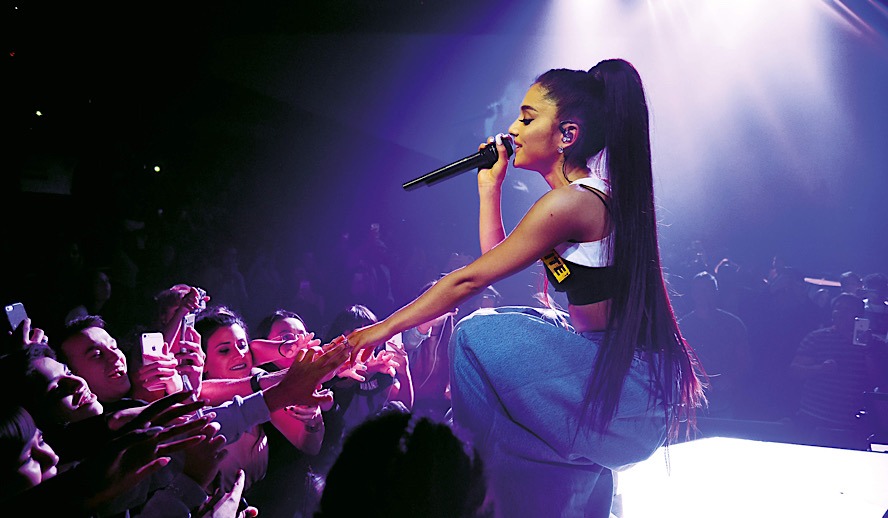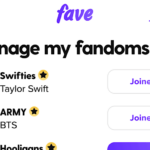Table of Contents

Photo: Cult Fandoms
What do Britney Spears, the New York Yankees, and Apple have in common? They all have some of the world’s largest and most dedicated fan bases. Whether it be sports fanatics, “stans” of popular singers, or Star Wars fanatics, some of our most proclaimed cultural markers have been largely popularized, less because of the entity’s talent or ability but because of their ironclad fanbases.
Giant communities of celebrity worshipers often brand themselves with names relating to their idols. Ariana Grande fans call themselves Arianators, Rihanna fans are called the Navy, Justin Bieber fans are called the Beliebers, Nicki Minaj fans are called the Barbz, and the list goes on.
But what precisely is a “fan” anyway? Why does an individual become a super-fan, and are there potential dangers to swearing allegiance to one celebrity or idol? What is the psychology behind cult fandoms?
Related article: K-Pop Fans Are Powerful Political Activists For A Better World
Related article: The Rise of Teen Idols Timothée Chalamet & Harry Styles: Destroying Toxic Masculinity
Defining “Stans” and the Kinds of Entities That Attract Them
The word “fan” comes from the Latin word fanaticus, which is defined as being “insanely but divinely inspired”. This is precisely the type of fan we will be observing. Obviously, showing interest is something any kind of consumer does, but what we’re interested in are those that have breached past casual or even intermediate enjoyment. To be called a cult fan, you need “emotional connection, identification, and expenditure of energy and money” (Reysen & Branscombe).
In the realm of social media, however, a relatively new phrase to describe a huge fan is “stan”, referring to someone that’s highly active in their obsession for a celebrity. The word comes from the song of the same name by Eminem, where he depicts a super-fan writing creepy letters to his favorite rapper. The word can be used as an adjective (this is my stan account), a noun (they’re a stan), or a verb (they stan for him). To simplify all this, just imagine that a stan is more passionate than a simple fan but not as obsessive as a stalker.
Luckily, psychologists have already created ways to measure someone’s celebrity obsession. A recent study cited something called the Celebrity Attitude Scale when assessing the correlation between psychological health and idolization. In this study, psychologists measured college students’ “celebrity adulation” with a series of questions that determined someone’s level of fanship.
Subscribe to Hollywood Insider’s YouTube Channel, by clicking here.
The scale has three different levels of celebrity admiration. They are “1) the entertainment-social subscale, 2) the intense-personal subscale, and 3) the borderline-pathological subscale.” The purpose of defining individuals into these distinct levels was to outline the distinct correlations found from a certain level of celebrity admiration and psychological characteristics.
How Cult Fandoms Fulfill Individual Needs
It only takes a few minutes on the Twitter trending page to find videos of what are known as “fancams”. These short edited clips feature stan pages chosen celebrities at their most exciting, cutest, or sexiest moments, typically with music and video filters plastered over the transitioning images and clips. These fancams can be of just about anyone doing anything, from Finn Wolfhard simply smiling and breathing, to edited compilations of BTS choreography. The thing about fancams is that the whole point of them is to showcase their favorite artist, meaning stan pages often comment their edited videos under Tweets that have nothing to do with that musician. In fact, K-Pop stans often get fake celebrity scandals trending on social media platforms so that when unexpecting individuals click to find out the drama, they’re bombarded with fancams instead of what the hashtag suggests.
When it comes to stan accounts aggressive use and often takeover of social media platforms, questions about human behavior begin to arise. The most pressing one potentially being, why do people need to be stans in the first place? What do stans and cult-fanship reflect about our needs as individuals?
Related article: The Power of Positivity: Ikorodu Bois + Chris Hemsworth + Russo Brothers + Sam Hargrave
Limited Time Offer – FREE Subscription to Hollywood Insider
When it comes to research about cult-fandom’s implications on the human psyche, sports by far has the most documentation. A study that brought points about sports fandom’s psychological implications claims that “the forming of sports teams reflects the importance of the role of coalition behavior in societies.” In other words, being a sports superfan is far deeper than about winning or losing, it’s essentially about psychological safety.
The source indicates how large crowds, regional tradition, and distinct paraphernalia provide an individual with “relative anonymity and deindividualization.” When one becomes a superfan of a sport, they are in some ways replacing elements of their identity with a sports team. The source continues by arguing “the reason to become a fan can be summarized under a taxonomy of essential needs, becoming fans in order to satisfy them.”
The three core needs outlined by the source are as follows: validation, pleasure, and excitement. The purpose of cult-fanship from a psychological standpoint is to fulfill one if not all of these needs most likely lacking from an individual.
Social identity theory claims that “individuals belonging to groups [obtain] positive and distinct social identities.” This explains why a lot of the world’s biggest fans are teenagers. Teens are arguably the largest demographic in pursuit of constant validation, pleasure, and excitement.
Of course, these findings are not true for every fan, and it’s important to remind ourselves that a large nuance of distinct types of fans exists. But by looking back at the findings of the celebrity attitudes scale, we can come to general conclusions about the correlations between a top tier obsessive idolizer and psychological health.
Related article: Hollywood Insider’s CEO Pritan Ambroase: “The Importance of Venice Film Festival as the Protector of Cinema”
Related article: The Masters of Cinema Archives: Hollywood Insider Pays Tribute to ‘La Vie En Rose’, Exclusive Interview with Director Olivier Dahan
Are There Potential Dangers of Cult-Fanship?
A 2014 study observed that individuals ranking highly on the Celebrity Admiration Scale often have psychological issues pertaining to depression and anxiety, body image, social dysfunction, and interpersonal boundaries. “The same study also found that stans may display narcissistic characteristics, stalking behavior” amongst a litany of other concerning behaviors. Addictive tendencies, criminality, and compulsive buying are among other negative characteristics cult fans find themselves developing.
One of the most concerning behaviors exhibited by fans is the practice of doxing. This is where stans target social media users who’ve expressed negative opinions of their favorite celebrity and release sensitive information about that user to the public. Because of the anonymity of stan accounts, many feel that they can tweet freely without consequence. This is the core of a lot of issues that occur because of stan culture. There is no consequence for your actions when a bulk of your online presence is attributed to an idea.
While I am in no way bashing stan culture or suggesting that everyone who participates in it is suffering from deep psychological damage, I am merely arguing that those in the top 1% of superfans, those that send death threats, dox, harras, and attack rival fans may be deep into a fog of psychological illusion.
Whether it be a sports super-fan or a fan of a popular celebrity, the psychology behind cult fanship is really a reflection of what we need as humans. Everyone needs protection, everyone wants a home and a family, and if some find themselves so deep in this pursuit that they’re behaving in irresponsible ways, then that’s more of a reflection of the Internet’s failure to create healthy safe spaces than it is of any individual’s failure to find it.
By Tyler Bey
Click here to read Hollywood Insider’s CEO Pritan Ambroase’s love letter to Black Lives Matter, in which he tackles more than just police reform, press freedom and more – click here.
An excerpt from the love letter: Hollywood Insider’s CEO/editor-in-chief Pritan Ambroase affirms, “Hollywood Insider fully supports the much-needed Black Lives Matter movement. We are actively, physically and digitally a part of this global movement. We will continue reporting on this major issue of police brutality and legal murders of Black people to hold the system accountable. We will continue reporting on this major issue with kindness and respect to all Black people, as each and every one of them are seen and heard. Just a reminder, that the Black Lives Matter movement is about more than just police brutality and extends into banking, housing, education, medical, infrastructure, etc. We have the space and time for all your stories. We believe in peaceful/non-violent protests and I would like to request the rest of media to focus on 95% of the protests that are peaceful and working effectively with positive changes happening daily. Media has a responsibility to better the world and Hollywood Insider will continue to do so.”
More Interesting Stories From Hollywood Insider
– Do you know the hidden messages in ‘Call Me By Your Name’? Find out behind the scenes facts in the full commentary and In-depth analysis of the cinematic masterpiece
– A Tribute To The Academy Awards: All Best Actor/Actress Speeches From The Beginning Of Oscars 1929-2019 | From Rami Malek, Leonardo DiCaprio To Marlon Brando & Beyond | From Olivia Colman, Meryl Streep To Bette Davis & Beyond
– Why Queen Elizabeth II Is One Of The Greatest Monarchs | Her Majesty Queen Elizabeth II of United Queendom of Great Britain & Northern Ireland
– Compilation: All James Bond 007 Opening Sequences From 1962 Sean Connery to Daniel Craig
– In the 32nd Year Of His Career, Keanu Reeves’ Face Continues To Reign After Launching Movies Earning Over $4.3 Billion In Total – “John Wick”, “Toy Story 4”, “Matrix”, And Many More
– Want GUARANTEED SUCCESS? Remove these ten words from your vocabulary| Transform your life INSTANTLY
cult fandoms, cult fandoms, cult fandoms, cult fandoms, cult fandoms, cult fandoms, cult fandoms, cult fandoms, cult fandoms, cult fandoms, cult fandoms, cult fandoms, cult fandoms, cult fandoms, cult fandoms, cult fandoms, cult fandoms, cult fandoms, cult fandoms, cult fandoms, cult fandoms

Tyler Isaiah Bey is a writer and actor from Atlanta, Georgia. His emphasis on storytelling through his work guides him through his writing. His theatre background has given him a love for honest performance and a strong appreciation for art. Hollywood Insider’s focus on education, philanthropy, and anti-drama is the perfect platform for Tyler who’s unique and often intersectional perspective gives him a honed edge to the work he creates. He finds joy in discovering powerful crossroads of current events and media and infuses this cultural awareness into his writing. For it’s these intersections that make art so powerful and writing such a pleasure for Tyler.








